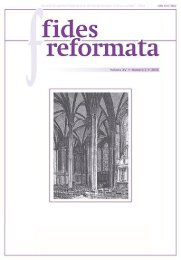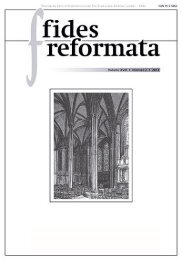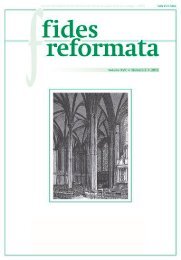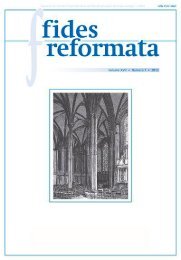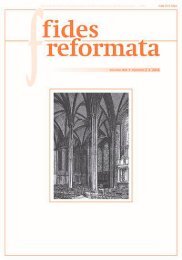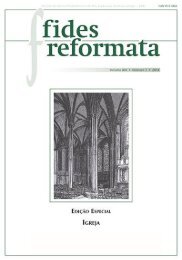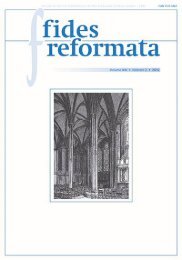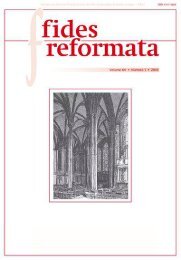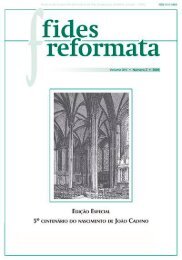Create successful ePaper yourself
Turn your PDF publications into a flip-book with our unique Google optimized e-Paper software.
FIDES REFORMATA XX, Nº 1 (<strong>20</strong>15): 89-105<br />
promises, and threats. At the end, it will demonstrate that, although the Reformer<br />
himself did not produce a systematic approach to covenant theology, it is<br />
possible to formulate a “Calvinian” system through his theological writings.<br />
1. covenant of works in the thought of john<br />
calvin<br />
The presence of a covenant of works in Calvin’s theology has long been<br />
a debated issue. Donald J. Bruggink in a controversial article published in<br />
1959 boldly affirmed that there was a complete absence of any intimation of<br />
a covenant of works made with Adam in Calvin’s writings. 3 Leonard Trinterud<br />
is another scholar who placed <strong>do</strong>ubt concerning the presence of a covenant<br />
of works in Calvin’s thought, at least as expressed in later works on federal<br />
theology like those of Ursinus, Olevianus, and the English Puritans. Although<br />
acknowledging Calvin’s frequent use of the word “covenant” in his works,<br />
Trinterud affirms that Calvin’s meaning and interpretation of the covenant was<br />
very different from his successors. 4 For him, Calvin viewed the covenant as a<br />
gracious act of God in which the burden of fulfillment was placed upon God<br />
alone, while for later theologians the covenant meant a mutual compact dependent<br />
on man’s response in obedience. 5 If Trinterud is right, than there is really<br />
no space in Calvin’s theology for a covenant of works which, by definition, is<br />
dependent on man’s faithfulness to God’s terms of covenant in order to enjoy<br />
its benefits.<br />
In spite of the contrary positions, an unbiased look at Calvin’s writings<br />
seems to point to the presence of a mutual contract between God and Adam<br />
before the Fall, at least in seminal form. The first evidence clearly found in<br />
Calvin’s writings is that Adam’s relationship with God was conditioned by the<br />
Creator’s commands. The tree of life was to be a reminder of Adam’s source<br />
of life. “Man, as often as he tasted the fruit of that tree, should remember<br />
whence he received his life, in order that he might acknowledge that he lives<br />
not by his own power, but by the kindness of God alone.” 6 The tree of the<br />
knowledge of good and evil served as an instrument to test Adam’s obedience<br />
3 Peter A. Lillback, “Ursinus’ Development of the Covenant of Creation: a Debt to Melanchthon<br />
or Calvin?,” Westminster Theological Journal 43, n. 2 (March 1981): 274.<br />
4 “For Calvin… the covenant of God is God’s promise to man, which obligates God to fulfill…<br />
In the covenant theory of the Rhineland and of the English reformers, the covenant is a conditional<br />
promise on God’s part, which has the effect of drawing out of man a responding promise of obedience,<br />
thus creating a mutual pact or treaty. The burden of fulfillment rests upon man, for he must first obey in<br />
order to bring God’s reciprocal obligation into force.” Leonard J. Trinterud, “The Origins of Puritanism,”<br />
Church History <strong>20</strong>, n. 1 (March 1951): 45.<br />
5 Trinterud, “The Origins of Puritanism,” 56n27.<br />
6 John Calvin, Commentaries on the First Book of Moses Called Genesis, trans. John King, v. 1<br />
(Grand Rapids, MI: Baker Book House, <strong>20</strong>05), 117.<br />
91





